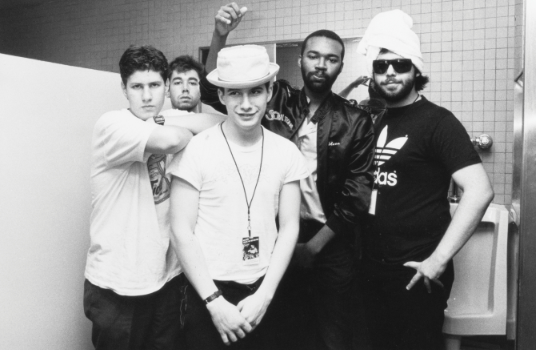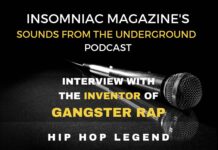By Khalid Strickland a.k.a. Black Pacino

Pipin’ hot beats made fresh daily…
Nowadays, mainstream rap beats are so sweet they can make a listener diabetic. Dipping into the same stagnant pool, hordes of identical producers wage their own version of the Clone Wars. It’s against this backdrop that Presto, a refreshing producer from Culver City, California, forges his organic, jazz-tinged beats. After releasing a slew of acclaimed instrumental-only albums and singles on Concrete Grooves, the label that he co-founded, Presto has a new LP causing heads to nod worldwide.
Released this past June, Presto’s State of the Art has garnered well-earned praise for its inventiveness and quality. Loading his latest album with versatile and soulful beats, Presto also steps up the game with an arsenal of skilled rappers contributing verses. Sadat X, O.C. and Large Professor team up on State of the Art’s first single, “Conquer Mentally.” CL Smooth, Fatlip of The Pharcyde, Blu and T Weaponz also make memorable appearances as well. To ensure that the music sounds crisp, Presto had a bulk of the tracks mixed by Troy “MixbyMail” Hightower, the celebrated engineer who lent his Midas touch to classic releases by Onyx, Redman and Method Man, De La Soul, Common, Big Pun and a lion’s share of other notables. Presto is making beautiful noise in the rap game and his presence is more than welcome.
In an exclusive interview with Insomniac, Presto detailed how he constructed this crown jewel of an album, and had some words of wisdom for aspiring producers.
Black Pacino: You’ve got an interesting mix of rappers on this album. How’d you choose who would be on it?
Presto: Well, this album started out originally as an EP. The first track I did was “Conquer Mentally” which was a track with Sadat X, O.C. and Large Pro. I finished that track and from there I started doing more tracks and then it slowly turned into an album. So there’s some known names and there’s some unknown names but I kind of wanted to mix it up like that.
BP: Did you tailor each beat with the artist in mind or did they come and adapt to your style?
Presto: Some of the tracks were done where I would send artists some beats and then they would pick one. And then some tracks I would actually make to tailor for the artist. Like the CL (Smooth) track, when I was making it I was thinking of pitching it to him, so I kind of went into that vibe.
BP: For somebody that’s not familiar with your work, how would you describe your sound and style of music?
Presto: I think my music is kind of like a three-piece band. It’s simple but it’s musical… there’s a lot of layers to it. I mean, you have the smooth and the gritty sounds and then it kind of balances out. It’s got a soul and jazz edge to it, you know?
BP: What do you hope to accomplish with this album?
Presto: Well, I definitely want to get it out there to also get more work from other artists and labels. This album is basically something I’ve been working towards through this whole process, you know? So it’s built up to this and then I’m hoping to get more work from this, and licensing as well.
BP: Is production something you always wanted to do? Did you grow up wanting to make music?
Presto: I started off as a deejay when I was in high school and I was playing a lot of hip-hop stuff like A Tribe Called Quest, Pharcyde, De La Soul, Pete Rock & CL… and deejaying was almost like a bridge for me to get into production. Once I got into deejaying, I started learning a lot about how songs were sequenced; like hooks and verses and all that. So then when I discovered beat-making, it was like I carried that ear with me into beat-making. So I kind of knew a lot about how to put a song together from deejaying.
BP: How do you respond to people who say that producers shouldn’t sample anymore?
Presto: I like to mix both. I like to sample but I also like to play live instruments too. So I’ll kind of layer stuff. As long as you’re doing what you do, that’s all that matters.
BP: You’ve been involved in Hip-Hop for a long time obviously; you’ve listed some of the favorites you enjoyed growing up. How do you feel about Hip-Hop music nowadays? Do you like what you’re hearing and seeing when you flip on the video programs and such?
Presto: I think a lot of the commercial stuff now is… I feel like it’s missing soul. I feel like artists aren’t putting as much of their soul into it anymore. But there’s still a lot of good music out there too. It’s just that I feel you have to dig for it, you know?

BP: Back in the day if somebody wanted to be a producer, they would have to spend a lot of money to get equipment and go to the studio. Nowadays, with computer programs like Reason and stuff, everybody pretty much has access to equipment. Do you think that helps or hurts the production game? Does it matter at all?
Presto: Well I think it definitely helps producers because you have a lot more channels to get your music done. Back in the day, you were lucky to have an MPC or something. But now you’ve got Pro Tools, you can record and mix your own stuff in your house. You can do everything. For the producer it definitely gives a lot more tools that are accessible. But for people making money off of running a studio, it puts them out of business, you know? But it’s definitely a good channel for a lot of artists to build their craft.
BP: When I used to read Scratch magazine…
Presto: Yeah, I love that magazine.
BP: Yeah, it’s defunct now. Well in that magazine, at the end of each producer spotlight, they would list what equipment they used. You’ve got a lot of overnight producers; people who feel that if they go and buy those machines, they can sound just as good as a Dre or a Presto. Do you think that equipment makes a producer or does it really matter?
Presto: I don’t think it matters what you use because whatever you do it’s your soul coming out into the beat or the song. It’s all about how you use the machine. But I do think you should master one machine first because then you know it inside and out. Then you can kind of build off of that and get other equipment to use with it. But you don’t ever just want to get some gear, use it for a while, quit using it and use some new gear, because you really don’t become a master of that machine. For me, I started off on the ASR-10 keyboard and I’m still using it now. I got that back in ’96, but I’ve bought others since and stuff that I use with it. I’ll record on Pro Tools but I don’t make my music in Pro Tools. I like using outboard gear.
BP: Are there any artists you haven’t worked with that you would like to collaborate with in the future?
Presto: I’ve always wanted to work with Mos Def and Talib Kweli. There’s a long list (laughs). Definitely them and Q-Tip would be dope too, (he’s) definitely one of my influences.
BP: Do you have a “creative process” or do you just go with the flow?
Presto: I usually like to make a skeleton beat and kind of sit on it for a while, then go back and work on it. Once in a while though, I’ll just make a whole song… a whole beat quick. That happens sometimes; sometimes I get lucky and do that. But I usually start with a hi-hat and chop some samples up and kind of build the drums and the bassline around that. Then I basically get the hook done for the beat and then once I have the hook done, I can take the sounds out to the verse part. If I can’t come up with a hook for the beat, then I usually end up using those beats for interludes or something.
BP: I know each song on your album is like your baby so it might be hard to make a choice but… do you have a favorite song on this joint that stands out in your mind?
Presto: It’s hard to answer that but I’d say “Conquer Mentally,” because a lot went into that song; even making that beat. That sample was a really hard sample to chop and I got the beat part down. But getting three different emcees on it, that took a while. Once I got it done it was there.
BP: Why did you decide to work with engineer Troy Hightower and what did he bring to your project?
Presto: Troy actually mixed a lot of songs on the album. Troy is the sonic genius… I mean, he really knows how to hear a song. He knows right where the volume should be and the effects and he’s really good at mixing vocals too. I’d have to say that out of all the engineers I’ve worked with, he’s really great at mixing vocals. No doubt.
BP: One last question. Do you think a good producer tailors his beats for an artist, or do you think an artist should tailor his style to a producer? If you listen to Common’s last project, you could hear a lot of Kanye’s influence in his work, almost down to the rhymes in some cases. So do you think it should be mix of both, or should a producer impose his will on an artist?
Presto: I think it should be a mix of both. I think sometimes you can make a beat and you can bring something out of the artist that they normally wouldn’t do. So that can be good, but you also don’t want to go pitch a beat to an artist that’s too different from what they normally do because it might not work. I think you kind of balance both. I think that’s what Common did on the album with Kanye. I think they kind of balanced both, because you still hear Common but you hear Kanye too. You want to hear the vocalist’s presence and the producer’s presence, not one or the other.

For more information on Presto, visit www.myspace.com/prestojazz and www.concretegrooves.com.
For more infomation on engineer Troy “MixbyMail” Hightower, visit www.MixByMail.com or www.HightowerProductions.com.
For more stories and work by Black Pacino, visit www.myspace.com/blackpacino or www.supremearsenal.com.


